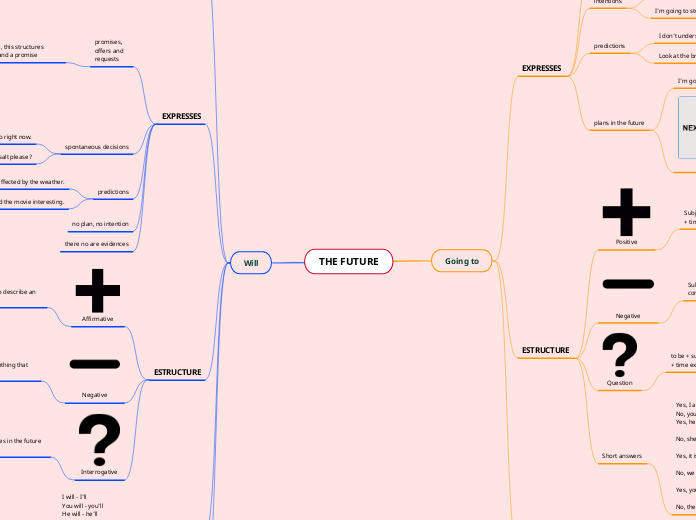da Michelle Araiza mancano 3 anni
182
THE FUTURE

da Michelle Araiza mancano 3 anni
182

Più simili a questo
The interrogative sentences help us for activities in the future or requests in a polite way of something.
WILL + SUBJECT + VERB + ?
Will you tell him the truth?
Will they win the cup?
Will you do tomorrow ? Will subject verb complement
The negative sentences are used to express something that we believe is not possible to happen in the future
SUBJECT + WON'T + VERB
She won't listen to anything I say.
I told him to clean his room but he won't do it.
She won't go out with you, stop insisting. Subject will not verb complement.
When we use will in an affirmative way, we try to describe an action that is possible to happen in the future.
SUBJECT + WILL + VERB
I'll drive you to work if you want.
If you say anything I will kill you!
I will grow old with you Subject will verb complement
I think you will find the movie interesting.
Our outdoors ballet recital won´t be affected by the weather.
Will you pass me the salt please?
I think we'll go right now.
We use “Will” to make promises because, this structures stablishes the difference of an intention and a promise
I will love you for the rest of my life.
Will you give me your paw?
Yes, I am. No, you aren't. Yes, he is. No, she isn't. Yes, it is. No, we aren't Yes, you are. No, they aren't.
to be + subject + going to + verb in simple form + complement + time expression?
Are they going to organize the meeting?
Is it going to rain tonight?
Am I going to get a new cellphone?
Subject + to be NOT + going to + verb in simple form + complement + time expression
You are not (aren't) going to buy another cake
I am not ('m not) going to go out tonight
He not (isn't) going to marry her
Subject + to be + going to + verb in simple form + complement + time expression
He is going to buy a present
You are going to play soccer
I am going to study literature
Time expressions
I'm going to study for my exam
Look at the bright sky. I'ts gping to be a sunny day.
I don't understand. I'm going to fail the exam.
I'm going to study.
I failed my last exam. I'm going to study harder next year.
When I grow up, I'm going to be a firefighter.